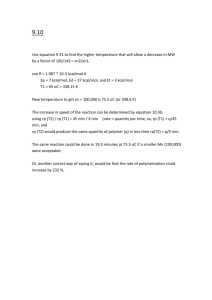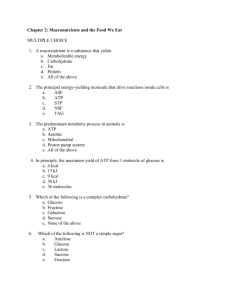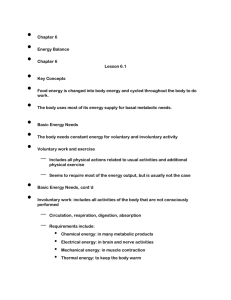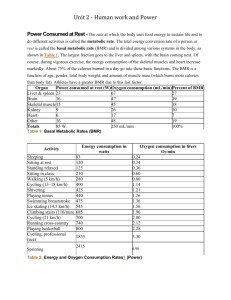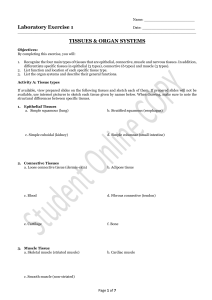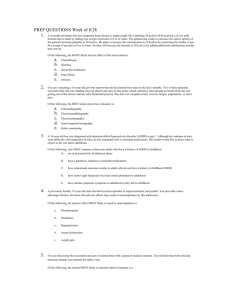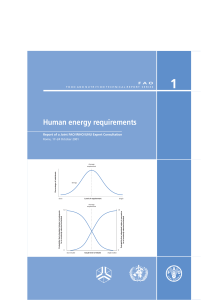Energy Assignment - Victoria College
advertisement
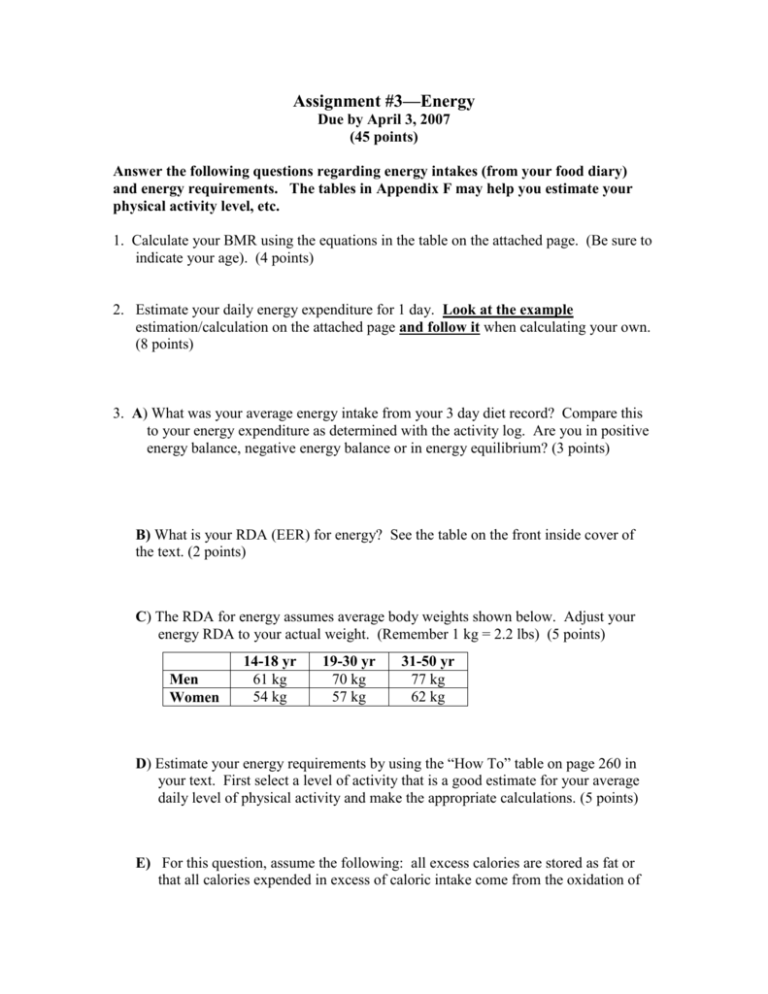
Assignment #3—Energy Due by April 3, 2007 (45 points) Answer the following questions regarding energy intakes (from your food diary) and energy requirements. The tables in Appendix F may help you estimate your physical activity level, etc. 1. Calculate your BMR using the equations in the table on the attached page. (Be sure to indicate your age). (4 points) 2. Estimate your daily energy expenditure for 1 day. Look at the example estimation/calculation on the attached page and follow it when calculating your own. (8 points) 3. A) What was your average energy intake from your 3 day diet record? Compare this to your energy expenditure as determined with the activity log. Are you in positive energy balance, negative energy balance or in energy equilibrium? (3 points) B) What is your RDA (EER) for energy? See the table on the front inside cover of the text. (2 points) C) The RDA for energy assumes average body weights shown below. Adjust your energy RDA to your actual weight. (Remember 1 kg = 2.2 lbs) (5 points) Men Women 14-18 yr 61 kg 54 kg 19-30 yr 70 kg 57 kg 31-50 yr 77 kg 62 kg D) Estimate your energy requirements by using the “How To” table on page 260 in your text. First select a level of activity that is a good estimate for your average daily level of physical activity and make the appropriate calculations. (5 points) E) For this question, assume the following: all excess calories are stored as fat or that all calories expended in excess of caloric intake come from the oxidation of fat. Remember that fat contains 3500 kcal/pound. Using your energy expenditure estimate from part (D) and your average caloric intake, determine how much weight you would gain or lose in 60 days. (5 points) F) Looking at all three estimates of your energy expenditure (2, 3c, 3d) which do you think is most accurate and why? (5 points) G) If someone was typically sedentary and decided to increase their regular physical activity to a moderate level, how many additional kcals would they expend per day? If their weight had been stable and they did not increase food consumption, how much of a weight loss would this translate into over 30 days? Use the table on page 260 again. (5 points) 4. A) Calculate your body mass index. BMI = mass in kg/height2. The units for height are in meters2. (1 ft = .305 meters) (2 points) B) What is the recommended range for BMI? (1 point) Equations for Estimating BMR from Body Weight Males (Age in yrs) Equations for deriving BMR in kcal/day Females (age in years) Equations for deriving BMR in kcal/day 10-18 (17.5 x weight) + 651 10-18 (12.2 x weight) + 746 18-30 (15.3 x weight) + 679 18-30 (14.7 x weight) + 496 30-60 (11.6 x weight) + 879 30-60 (8.7 x weight) + 829 Sample calculations for estimating daily energy expenditure First calculate your BMR. In general a good estimate for BMR is your weight in kilograms * 24. Of course your hourly BMR would simply be your weight in kg. In the book you will also find equations for estimating BMR. Regardless of which equation you use to determine your BMR, divide it by 24 hours to determine your hourly BMR. Example: if BMR = 1440 kcal/day, dividing by 24 hours gives an hourly BMR of 60 kcal/hr. Also, if you work out on a cardiovascular machine that calculates kcaloric expenditure, you may use that value. Activity Category Activity Duration (hours) Resting Sleeping/reclining 10 10 hr x 1.0 (from table) x 60 kcal/hr (BMR/hr) 600 kcal Very light Studying, watching TV, class, cooking 10 10 * 1.5 * 60 900 kcal Light Cleaning house 1 1 * 3 * 60 180 kcal Moderate Walking 1 1 * 5 *60 300 kcal Heavy Aerobics/weights 1.5 1.5 * 7 * 60 630 kcal Extremely heavy Running .5 .5 * 15 *60 450 kcal TOTAL 24 Calculation Energy expended 3060 kcal

